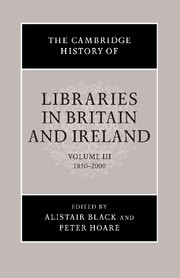Book contents
- Frontmatter
- Introduction: sources and methodologies for the history of libraries in the modern era
- 1 Libraries and the modern world
- Part One Enlightening the Masses: the Public Library as Concept and Reality
- Part Two The Voluntary Ethic: Libraries of our Own
- Part Three Libraries for National Needs: Library Provision in the Public Sphere in the Countries of the British Isles
- 15 Introduction: library provision in the countries of the British Isles
- 16 The library scene in an English city: Newcastle upon Tyne libraries 1850–2000
- 17 Public libraries in Wales since 1862
- 18 The National Library of Wales
- 19 The Scottish library scene
- 20 The National Library of Scotland
- 21 The Irish library scene
- 22 The National Library of Ireland
- Part Four The Nation's Treasury: Britain's National Library as Concept and Reality
- Part Five The Spirit of Enquiry: Higher Education and Libraries
- Part Six The Rise of Professional Society: Libraries for Specialist Areas
- Part Seven The Trade and its Tools: Librarians and Libraries in Action
- Part Eight Automation Pasts, Electronic Futures: the Digital Revolution
- Bibliography
- Index
- References
21 - The Irish library scene
from Part Three - Libraries for National Needs: Library Provision in the Public Sphere in the Countries of the British Isles
Published online by Cambridge University Press: 28 March 2008
- Frontmatter
- Introduction: sources and methodologies for the history of libraries in the modern era
- 1 Libraries and the modern world
- Part One Enlightening the Masses: the Public Library as Concept and Reality
- Part Two The Voluntary Ethic: Libraries of our Own
- Part Three Libraries for National Needs: Library Provision in the Public Sphere in the Countries of the British Isles
- 15 Introduction: library provision in the countries of the British Isles
- 16 The library scene in an English city: Newcastle upon Tyne libraries 1850–2000
- 17 Public libraries in Wales since 1862
- 18 The National Library of Wales
- 19 The Scottish library scene
- 20 The National Library of Scotland
- 21 The Irish library scene
- 22 The National Library of Ireland
- Part Four The Nation's Treasury: Britain's National Library as Concept and Reality
- Part Five The Spirit of Enquiry: Higher Education and Libraries
- Part Six The Rise of Professional Society: Libraries for Specialist Areas
- Part Seven The Trade and its Tools: Librarians and Libraries in Action
- Part Eight Automation Pasts, Electronic Futures: the Digital Revolution
- Bibliography
- Index
- References
Summary
The first library legislation to apply to Ireland was the UK Public Libraries Act of 1850, which allowed town councils in Britain with a population of 10,000 or more to levy a rate of a halfpenny in the pound on property to support public libraries in their area. This Act was extended to Ireland in 1853 but was of little practical benefit, as municipal authorities of such size did not exist in Ireland at that time.
The principal Act which allowed the establishment of public libraries in Ireland was the Public Libraries (Ireland) Act 1855, which allowed municipal and town councils with a population of 5,000 or more to establish a library and levy a rate to a maximum of one penny to support it. A two-thirds majority of householders was required to pass the Act. In spite of subsequent amendments to the 1855 Act in 1877 and 1894, adoption of the Acts was slow. Dundalk was the first public library in the country to open under this legislation, in 1858. The city of Cork had been the first to adopt the Act in 1855, but a rate was not struck until 1892. Even by 1880 only Dundalk and Sligo had opened public libraries, though the 1880s saw some improvement with Belfast, Dublin, Kingstown (now Dún Laoghaire), Limerick and Rathmines (at that time a township just outside Dublin city boundaries) all adopting the Act. The situation in Dublin itself was unique: the first public libraries, in Thomas Street and Capel Street, both founded in 1884, and North William Street, founded in 1899, were funded not by the library rate but by a yearly grant of £500 to each branch as well as £300 for the purchase of books.
- Type
- Chapter
- Information
- The Cambridge History of Libraries in Britain and Ireland , pp. 253 - 265Publisher: Cambridge University PressPrint publication year: 2006
References
- 1
- Cited by



